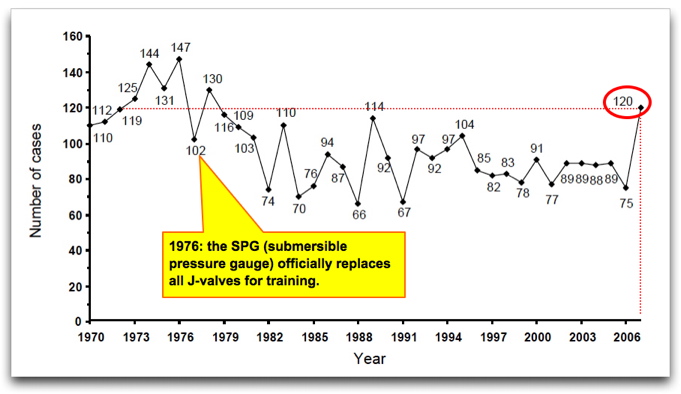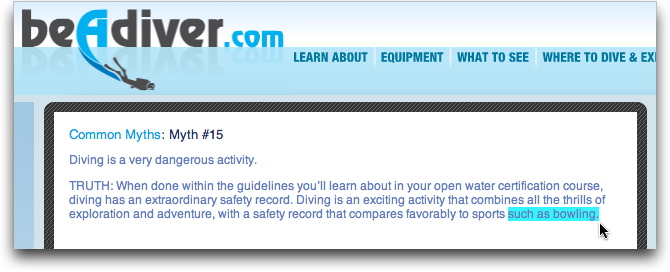Some statistics show that newer divers are at MUCH greater risk vs. older divers who have better learned how to avoid mishap. If new DMs and Instructors are encouraged to trivialize the factual hazards of diving, that could
maybe increase mishaps for their students.
Arguably, the only legitimate way to calculate risk is by "exposure time."
The white-water rafting industry calculates their safety statistics based upon days-on-river (i.e. exposure time) per participant.
The ski industry tracks accidents by days-on-mountain.
Given the size of the global recreational dive industry - over $1 billion p/y, and the preoccupation with statistical tracking to determine safe decompression algorithms, it is very curious that the data about diving accidents is so murky.
In response to a triple dive fatality, the Abacus Project attempted to bring clarity to dive risks. For 14 months in British Columbia, the number of dive tank air-fills were tracked vs. local recreational dive accidents. Assuming that nothing in this study was "gamed" (i.e. knowing this first-of-its-kind study might impact liability insurance rates, could participating retailers over-report the number of air-fills? Also, local dive professionals may have increased their vigilance for safety above their norm) the results:
2.05 deaths per 100,000 dives.
The three victims were all new divers; two died during training, a third was just certified and died while accompanied by an instructor.
Let's factor each "Abacus" dive as a 1-hour "exposure" to risk. Compare that to occupancy time in automobiles. DOT (Department of Transportation) tracks
fatalities-per-million-miles-driven, but they don't know the average speed. To be charitable to diving's risk - we'll divide those miles by 60 MPH to net total
hours of exposure (of course vehicles average less than 60 MPH).
So...2008 saw 37,260 auto fatalities in 2.926 Trillion miles. Allowing 60 MPH average speed, that’s 48.766 Billion hours of moving automobiles. Allowing 1.2 occupants per vehicle, that’s 58.52 Billion total vehicle occupant hours = 0.0637 fatalities per 100,000 occupant hours of auto travel.
The Abacus results are 32X more fatalities-per-hour-of-exposure vs. automobile occupancy.
A Japanese study mentioned in the
Undercurrent newsletter, June 2001, found diving between 39X and 62X deadlier than being in an automobile: (from page 16 / bottom of last page of the PDF)
Back in the driver’s seat: How often have you heard that diving is: “A lot safer than driving down a freeway, right?” Japanese researchers decided to find out. Deaths per participant were no measure of safety, they thought. A better measure would be deaths per hour engaged in the activity. In looking at Japanese diverand traffic deaths, they found the diving fatality rate to be “10.6 - 24.4 and 15.3 -19.7 with 95 percent and 50 percent of confidence respectively whereas that of driving was 0.206 - 0.270 and 0.232 - 0.244.” This means that recreational diving is 39 and 62 times riskier with 95 percent and 50 percent confidence, respectively, than driving a car.
Ikeda, T. and Ashida, H., Is Recreational Diving Safe? Division of Environmental Medicine and Division of Biomedical Information Sciences, National Defense Medical College Research Institute, Tokorozawa, Japan.
----
I believe that a lackadaisical attitude for safety increases dive deaths. But that's mere opinion, not hard data, so make up your own minds. There
is provocative data from DAN - during a time when many repeated the old saying, "Diving is as safe as bowling."
Dive deaths reported by DAN in 2007 spiked 60% from 2006, hitting a 30-year peak. This was the worst year-to-year % jump in 20-years. This is from
DAN’s 2008 report, published in 2009, RE 2007 fatalities (page 8):
This 2007 spike in dive fatalities coincides with the beginning of the "Be A Diver" marketing campaign, which of course could mean nothing and just be a statistical anomaly.
Can anyone cite
the very first time that the "diving is as safe as bowling" claim was made?
To be clear of my agenda... I don't want a Nanny state or a country where kids grow up afraid to take risks. I'm no Chicken Little and have taken plenty of calculated risks in diving and aviation. I started flying hang gliders in 1973 and as a director / cameraman have ~2,000 hours filming from fixed-wing and helicopters - usually flying too low, too fast or in locations too remote to survive the unexpected. I believe in planning for the worst and have had the privilege to work with some of the best pilots and mechanics in the world. I've been consulted after movie aviation tragedies when "experts" cut corners. In basic aviation, students are taught to analyze disasters, so they may better avoid being fodder for future students. Accidents are horrible for the victim's family, and bad for business. Pretending that hazards don't exist to lure customers is simply wrong. Genuinely safe training will lure plenty of customers.
OK, back on topic...who's ready to earn extra credit?
(A) Cite the
source data that was used to make the bowling claim.
(B) Characterize the reliability of that source data that was used to make the bowling claim.
(C) What other data-sets were
excluded to make the bowling claim.
--------------
Let's put this old game in perspective...







